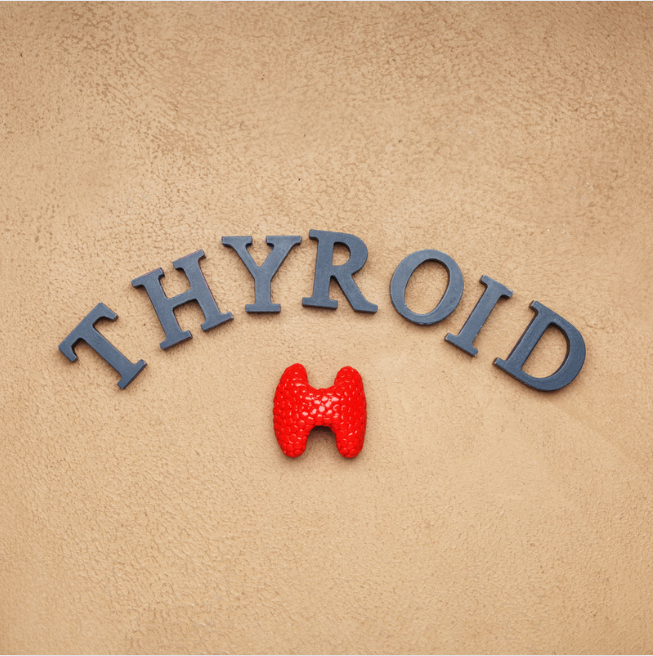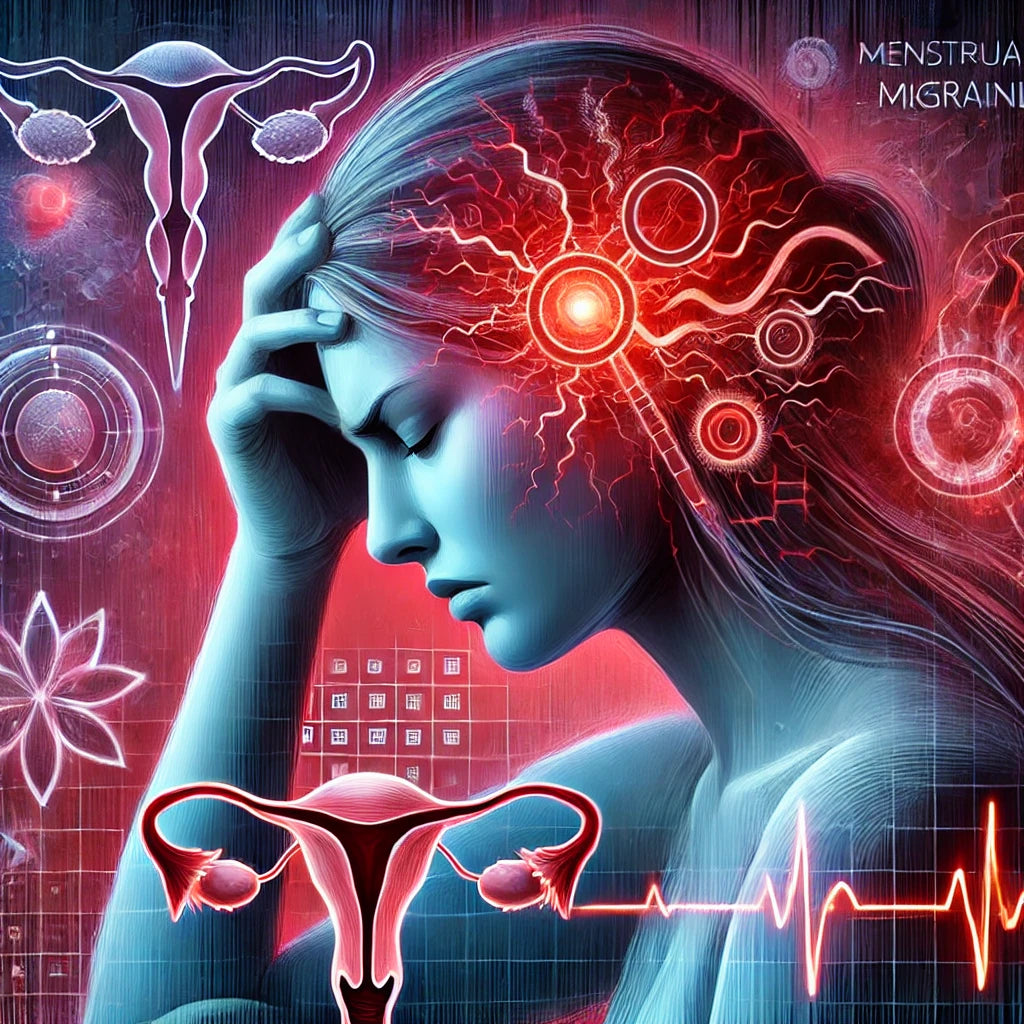
The Connection Between Thyroid Health and Menstrual Health
When it comes to reproductive health, most women are aware of the importance of balancing their hormones. However, one hormone system that is often overlooked, yet plays a crucial role in regulating menstrual cycles, is the thyroid. The thyroid, a small butterfly-shaped gland in your neck, produces hormones that control metabolism, energy production, and many other bodily functions. But did you know that your thyroid also has a direct impact on your menstrual health?
In this blog post, we’ll explore the vital connection between thyroid health and the menstrual cycle, how thyroid imbalances can affect your period, and what steps you can take to keep your thyroid (and your cycle) in check.
What is the Thyroid and What Does it Do?
The thyroid gland produces two primary hormones: thyroxine (T4) and triiodothyronine (T3). These hormones regulate metabolism, energy production, and the functioning of many organs throughout the body, including the heart, brain, and digestive system.
In addition to T3 and T4, the thyroid also produces calcitonin, which helps regulate calcium levels in the body, though it has less of an impact on menstrual health.
Thyroid function is controlled by a feedback loop involving the hypothalamus (a part of the brain), the pituitary gland, and the thyroid itself. When thyroid hormone levels are too high or too low, it can disrupt this delicate balance and impact various bodily functions, including menstruation.
How Thyroid Imbalances Affect Menstrual Health
1. Hypothyroidism (Underactive Thyroid)
Hypothyroidism occurs when the thyroid does not produce enough thyroid hormones (T3 and T4). This can slow down the metabolism and affect many bodily systems, including the reproductive system.
Impact on Menstrual Cycle:
- Irregular Periods: Hypothyroidism can lead to irregular menstrual cycles, where periods become less predictable, heavier, or longer than usual.
- Amenorrhea: In some cases, hypothyroidism can cause amenorrhea, which is the absence of periods for several months or longer.
- Heavy Periods (Menorrhagia): Low thyroid function can also cause very heavy or prolonged periods, as thyroid hormones help regulate the release of hormones that control the menstrual cycle.
- PMS Symptoms: People with hypothyroidism often experience more severe premenstrual syndrome (PMS) symptoms, such as fatigue, irritability, and bloating.
Other Symptoms of Hypothyroidism:
- Fatigue and sluggishness
- Weight gain
- Dry skin and hair
- Cold intolerance
- Depression or mood swings
- Constipation
When thyroid hormone levels are low, the pituitary gland compensates by producing higher levels of thyroid-stimulating hormone (TSH). This imbalance in the body’s hormonal feedback loop can also impact the levels of prolactin, the hormone responsible for milk production. High prolactin levels can further disrupt the menstrual cycle.
2. Hyperthyroidism (Overactive Thyroid)
Hyperthyroidism is the opposite of hypothyroidism, occurring when the thyroid gland produces too much thyroid hormone (T3 and T4). This can lead to an overactive metabolism, causing the body’s systems to speed up.
Impact on Menstrual Cycle:
- Shorter Periods or Lighter Flow: Hyperthyroidism can cause periods to become lighter, shorter, or more spaced out. Women may notice they have less bleeding and shorter cycles.
- Oligomenorrhea: Hyperthyroidism may cause oligomenorrhea, which refers to infrequent menstrual cycles, or a lengthening of the time between periods.
- Amenorrhea: In some cases, hyperthyroidism can lead to the absence of periods altogether.
Other Symptoms of Hyperthyroidism:
- Unexplained weight loss
- Rapid heartbeat (tachycardia)
- Increased appetite
- Anxiety or nervousness
- Insomnia or difficulty sleeping
- Tremors or shaky hands
- Sweating and heat intolerance
Excess thyroid hormones in the body can alter the secretion of reproductive hormones like estrogen and progesterone, leading to disruptions in the menstrual cycle.
How Thyroid Health Affects Fertility
Both hypo- and hyperthyroidism can negatively affect fertility. The thyroid’s influence on reproductive hormones can make it more difficult for women to conceive.
-
Hypothyroidism and Fertility: With hypothyroidism, hormonal imbalances can interfere with ovulation, the process where an egg is released from the ovary. This can make it harder to get pregnant. Hypothyroidism can also lead to early pregnancy loss, as low thyroid hormone levels may affect the lining of the uterus, making it less receptive to a fertilized egg.
-
Hyperthyroidism and Fertility: In hyperthyroidism, irregular periods and anovulation (lack of ovulation) are common. These disruptions in the menstrual cycle can lead to difficulties in getting pregnant, as the body is not following a regular ovulation pattern.
Fortunately, thyroid imbalances can often be managed with appropriate treatment, which can help restore normal menstrual cycles and improve fertility.
Diagnosing and Treating Thyroid Imbalances
If you’re experiencing irregular periods, heavy periods, or other symptoms of thyroid dysfunction, it’s important to consult with a healthcare provider. A blood test can measure levels of thyroid hormones (T3, T4) and TSH, providing insight into your thyroid function.
Common Tests for Thyroid Function:
- TSH Test: Measures the level of thyroid-stimulating hormone. High TSH levels often indicate hypothyroidism, while low TSH levels suggest hyperthyroidism.
- Free T4 and Free T3 Tests: These tests measure the actual levels of thyroid hormones in the blood.
- Thyroid Antibody Test: This test checks for autoimmune thyroid diseases like Hashimoto’s thyroiditis (hypothyroidism) or Graves’ disease (hyperthyroidism).
Once diagnosed, treatment options for thyroid imbalances typically include:
-
For Hypothyroidism: Thyroid hormone replacement therapy, often in the form of synthetic levothyroxine (T4), can help normalize thyroid hormone levels. This can lead to a return to a more regular menstrual cycle.
-
For Hyperthyroidism: Treatment may involve antithyroid medications (such as methimazole), radioactive iodine therapy, or even surgery to remove part of the thyroid. In some cases, managing hyperthyroidism can restore regular menstruation.
It’s important to work with a healthcare provider to monitor thyroid levels regularly, as hormonal adjustments may be needed over time to ensure optimal thyroid function.
Supporting Thyroid Health Naturally
In addition to medical treatment, certain lifestyle changes can help support healthy thyroid function:
-
Maintain a Balanced Diet:
- Iodine is crucial for thyroid health. Include iodine-rich foods like seaweed, fish, dairy, and iodized salt in your diet.
- Selenium and zinc are also important for thyroid function. Foods like Brazil nuts, sunflower seeds, and pumpkin seeds are rich in selenium, while zinc is found in meats, legumes, and nuts.
- Avoid Goitrogens (in excess): Goitrogens are compounds found in cruciferous vegetables like broccoli, kale, and cabbage. While they’re healthy in moderation, excessive consumption can interfere with iodine uptake and thyroid function.
-
Reduce Stress: Chronic stress can exacerbate thyroid problems by increasing cortisol levels, which interfere with thyroid hormone production. Consider practicing stress-reducing activities like yoga, meditation, or deep breathing exercises.
-
Exercise Regularly: Physical activity supports metabolism and hormone regulation, which can benefit thyroid health. However, over-exercising can also impact thyroid function, especially in women with hypothyroidism, so balance is key.
-
Get Enough Sleep: Sleep plays an important role in hormone regulation. Make sure to get 7-9 hours of restful sleep each night to support your thyroid and overall health.
Conclusion
The thyroid plays an essential role in regulating the menstrual cycle, and any imbalance—whether underactive (hypothyroidism) or overactive (hyperthyroidism)—can have significant impacts on menstrual health. If you’re experiencing irregular periods, changes in flow, or difficulty conceiving, it’s important to consider the health of your thyroid and consult with a healthcare provider.
With proper diagnosis and treatment, thyroid imbalances can be managed effectively, restoring menstrual regularity and improving overall health. Supporting thyroid health through a balanced diet, stress management, and regular physical activity can also help maintain hormonal balance and overall well-being.



